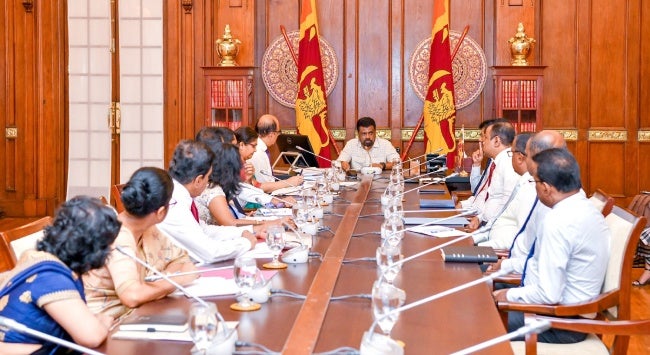Dissanayake’s First Year in Office:
Navigating Sri Lanka’s Challenges
Rajni Gamage, Preeti Chandrakumar Patil
23 September 2025Summary
On 23 September 2025, Sri Lankan President Anura Kumara Dissanayake marked one year in office. Amid a fragile post-default economy, his government has pursued legitimacy through a strong anti-corruption agenda. Despite ongoing challenges around accountability and inequality, it maintains a popular mandate, aided by a divided opposition.
In the 2024 national elections, Anura Kumara Dissanayake and his party, the National People’s Power (NPP), came to power, marking a sharp decline of the political old guard amid a fragmented opposition. The NPP’s electoral mandate reflected strong public demand for more accountable management of public finances, as corruption and waste among the political elite were widely seen as key drivers of the 2022 debt default. The president’s election campaign prioritised equitable economic growth, the rule of law, holding the corrupt accountable and responding directly to calls for systemic change, a core demand of the 2022 protest movement.
On the economic front, the NPP government has largely continued the reform trajectory set by its predecessor, in line with the International Monetary Fund programme. Sri Lanka recorded five per cent growth in 2024, but this is expected to slow to 4-4.5 per cent in 2025. Meanwhile, official poverty estimates, which skyrocketed in the aftermath of the 2022 economic crisis, remain high at 24.5 per cent. Despite easing inflation, food prices more than doubled between 2021 and 2024, fuelling malnutrition and food insecurity. These conditions pose a challenge for the NPP, which came to power on high public expectations. With limited economic relief, the government now relies on measures like anti-corruption, rule of law and prevention of public finds wastage to maintain its legitimacy.
Anti-corruption Drive and Fragmented Opposition
There is a steady public perception that the NPP government is delivering, at least partially, on its anti-corruption mandate. Highly publicised legal actions have been initiated against members of past governments. Demonstrating policy continuity with reforms initiated by the previous administration, the NPP passed the Proceeds of Crime Act in April 2025 to facilitate the recovery of stolen assets and announced plans earlier this year to establish an Independent Prosecutor’s Office.
The arrest of former president Ranil Wickremesinghe in August 2025 on allegations of misappropriation of public funds marked a dramatic high point in the government’s anti-corruption drive. Subsequently, the passage of the President’s Entitlement (Repeal) Bill in September 2025 saw former presidents, including Mahinda Rajapaksa and Maithripala Sirisena vacating their official residences. While these actions have not addressed several major corruption or mismanagement scandals involving former leaders, such as the 2015 Central Bank Bond Scam or the 2019 Easter Sunday attacks, they have earned the government a measure of public approval. Notably, however, none of the key Rajapaksa brothers who were found by a Supreme Court judgement to be responsible for the 2022 economic crisis, has faced prosecution so far.
Wickremesinghe’s arrest partially united segments of Sri Lanka’s fragmented political opposition, with several parties and factions condemning the move and accusing the government of steering the country toward “constitutional dictatorship”. However, internal divisions persist, particularly between the United National Party (UNP), led by Wickremesinghe, and Samagi Jana Balawegaya (SJB), led by Sajith Premadasa largely due to leadership rivalries. The UNP recently lifted bans and disciplinary actions against members who had joined the SJB, a splinter party formed in 2020, signalling a potential resurgence of competition between the two parties over membership and political influence.
Managing Domestic and International Compulsions
On the issue of Tamil minority rights, the NPP government has largely emphasised economic development over addressing political aspirations tied to Tamil identity. Its position on the devolution of power remains ambiguous, with some NPP figures supporting the continuation of Provincial Councils, while others advocate replacing them with smaller administrative units. India has reiterated its support for the full implementation of the 13th Amendment during recent bilateral discussions. Provincial Council elections are reportedly slated for 2026, after a decade-long delay.
Meanwhile, the government has rejected the United Nations’ (UN) call for an international investigation into alleged war crimes during the civil conflict, which claimed over 100,000 lives. It has also failed to repeal the Prevention of Terrorism Act, long criticised by human rights groups for enabling the persecution of minorities and dissent, despite earlier promises to introduce a new law.
Currently, the president is on an official visit to the United States (US) to deliver a UN General Assembly address. The US is a key export market for Sri Lanka, especially for the country’s garment industry, which is expected to be severely affected by the 20 per cent tariffs imposed by the US. Sri Lanka is reportedly negotiating a free trade agreement with the US to mitigate these impacts. In the regional context, Sri Lanka’s delicate task of balancing relations between India and China faces a momentary respite, as India is currently on the back foot due to tensions with the US over tariffs and its growing ties with China. Meanwhile, Sri Lanka’s absence from the recent Shanghai Cooperation Organisation summit has been criticised as a missed opportunity for international economic cooperation, amid a global power shift toward Asian giants like China, India and Russia.
. . . . .
Dr Rajni Gamage is a Research Fellow at the Institute of South Asian Studies (ISAS), an autonomous research institute at the National University of Singapore (NUS). She can be contacted at r.gamage@nus.edu.sg. Ms Preeti Chandrakumar Patil is a former research intern at the same institute. She can be contacted at preetipatil@u.nus.edu. The authors bear full responsibility for the facts cited and opinions expressed in this paper.
Pic Credit: X
-
 More From :
More From :
-
 Tags :
Tags :
-
 Download PDF
Download PDF



